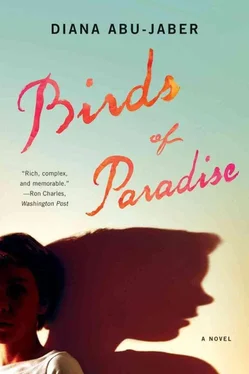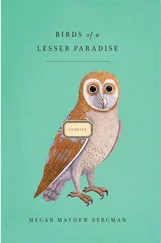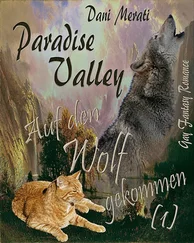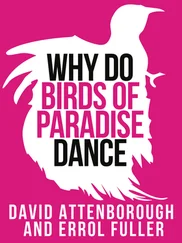“This is the first time I’ve been able to speak — openly.” He closes his eyes and squeezes her fingers; for one awful moment, she believes he’s about to cry. He opens his eyes again. “I’m certain that the son and husband were killed. It’s absurd to think otherwise. If you’d been there you could have seen for yourself. Just one ongoing massacre. If only we could have seen the bodies. She might have had some relief.”
He releases her hands. “There were nights when the fighting died down and then there was such a silence. It seemed like you could hear the land and the ocean breathing, exhaling, if it doesn’t seem too strange to say. There were nights…” His voice falters and he clears his throat briefly. “Sometimes we heard knocking. There were nights that we could hear a child out in the street crying, Maman, Maman! ” His voice is soft and light. “Over and over, just like that, so sweet. You couldn’t tell if it was a boy or girl. Solange became certain it was Antoine. Of course it wasn’t. There were so many orphans — everywhere. I wouldn’t let her go outside to look.” Head lowered, he lifts his eyes, their singed edges, to Avis. “It was the most dangerous at night. Do you understand? There were snipers. There were children with guns. They would use a crying child as a trick, to lure people out of their hiding places. But still, Solange screamed at me. She beat me with her fists like a man. I didn’t let her go.”
Avis stands. She picks up the plate of remaining pastries, takes them into the kitchen, spills them into a paper bag, and brings them to the man. “I’m sorry,” she says, her voice jumping. She isn’t sure what she’s saying to him. It occurs to her that he asked almost nothing about her friendship with Solange. Now she just wants him to take his terrible stories and go.
He mumbles his thanks again and leaves her a dingy business card. “In case you happen to hear something.”
AVIS WATCHES THE MAN'S form diminish as he moves up the street, the neighbors’ lawns dark as old emeralds. She remembers how she dreaded sleep in the months after Felice left. But her dreams were light and oddly pleasant — heartbreaking only upon waking. There were certain things she couldn’t say or think or hear in those months. Like daughter or child . Or lost . That was the worst of all, a sliver of metal under her breastbone. She woke from dreams in which she said it over and over, as if she were squeezing it from her body. She remembers the way she felt when she finally understood that Felice was not going to return, the sense of leadenness, the elemental weight of it filling her bones.
She gravitates to the French doors, studying the scenery behind the glass. Her gaze falls on a pile of weeds heaped up on the patio and she remembers that Solange had told her they had some sort of special properties — like a witch’s herb. The air riffles around her and it takes some minutes for her to remember why it feels so different. That quiet. There’s a crosshatching of faraway bird cries and distant lawn mowers, last-minute yard work before tomorrow’s storm. She finds she needs to sit down, flat on the cool rock. It feels as if steam is rushing through her body. She scoops up the piles of leaves Solange had left, gathering them into her lap. Her cell phone is in the front pocket of her cook’s pants: she extricates it, her fingers tremble, misdialing until she remembers the speed dial. Pound sign. Three. A string of red ants cuts jaggedly across the stone, inches from her. She watches them in a trance, then scans the thickets of palms that border their property. Voice mail picks up. Peering through the scrim of trees, she glimpses the curved iron door of the birdcage standing open. “Stanley,” she says to the machine. “Please. I’d like to come see you.”
She hadn’t felt — not in this immediate, personal way — just how much colder and sharper things could be, how planets could snap out of their orbits, how frigid, wasting blackness could come in a tide, erasing everything.
THE LOW CAR TURNS OFF ALTON ROAD ONTO ONE of the narrow numbered streets perpendicular to the ocean. Felice slides onto her back to gaze out the rear windshield. Usually the night sky is full of streetlights and sea mist, but once they turn, Felice notices a new clarity to the night; every scrap of cloud has dissolved and instead there are perfect constellations and a single red-white point of light sailing past like a space station.
It occurs to Felice that something about this man reminds her of Mr. Rendell. She wonders if she went with him tonight to take one last spill into her childhood, the sweet fever of old fear, making her feel so alive, sparkling. Everything smelled sharper and sounded clearer and the stars seemed to pop right out of the sky in those days. The smell of disinfectant and chalk and rosin and old instruments and Mr. Rendell’s piney aftershave all made her feel awake and alert. They roll up to Ocean Drive and Marren doesn’t bother with parking. He just stops in the street and puts on his flashers. “The cops know me.” He slings a forearm back over the headrest and studies Felice. “So come on, fairy princess, we’re here.”
“This is stupid.” The other man doesn’t turn around. “Big stupid waste of time.”
“You’re the one wants to let her go.” Marren’s eyes look hollow and carved-out under the streetlights. “Anyone ever tell you — hey—” The man gives his friend a shove. “She looks like Elizabeth Taylor! Right? Anyone tell you that?” He chews on the end of a toothpick ruminatively, then works it between a couple of molars. “Those eyes of hers.” He runs his fingertips along Felice’s brow bone. “God, I feel sorry for you,” he says abruptly. “What’s a little girl gonna do with a face like that?”
They climb out and the night sand under her sneakers is dense and damp, wet cement, barely curving under foot. She smells the aftermath of rain — it must’ve come while she was in the club. Her skin feels like a finely woven gauze: the rain melts in the air in white flashes, flourishes.
The music room was supposed to be their sanctuary. She wasn’t very good at violin, but she still enjoyed the rasp of the bowstrings, the cool tilt of the instrument under her chin — who knows why. The whole time she played, right from the start, she felt his eyes on her profile. Mr. Rendell’s gaze, always there, hovering in the air. Even when he wasn’t looking at her directly, he was still looking. Eyes hovering like bees. The music room belonged to her and Hannah. After class, they claimed the room for hours — supposedly to practice, Felice on violin, Hannah on clarinet — even though Hannah always said it was pointless — it wasn’t like they were going to become musicians. They used to eat the palmiers and meringues Avis packed for Felice, and one day Hannah held up the scroll of a palmier and said in a languid, speculative way, “I wonder why your mother is trying to make you fat.” She glanced at Felice, her dark, solemn eyes shining. “Do you ever think about that?”
Felice smirked. “You’re crazy. She’s a baker .”
Hannah sniffed a meringue, then tossed it into a trash bin. “You ever wonder if she’s trying to poison you? Because, seriously? I think she might be.”
Sometimes Hannah would light a cigarette. She’d hand it to Felice, who held it up between two fingers, admiring the thin white trickle of smoke. She didn’t puff on it, though: Stanley was contemptuous of smokers. She and Hannah lounged on the gray upholstered couch pushed against the wall. One day Hannah talked about her older brother Simon (Semir) who’d killed himself by drinking the cleaning fluids stored under the bathroom sink. She talked about it in a casual way, as if she were describing a shopping trip.
Читать дальше












